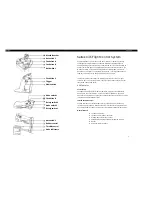
Description of Groups
vacon • 28
Service support: find your nearest Vacon service center at www.vacon.com
3
3.3.9
Group Protections: Menu PAR G9
Parameters of Motor thermal protection (P9.11 to P9.14 and P9.21-P9.22)
The motor thermal protection is to protect the motor from overheating. The drive is capable of
supplying higher than nominal current to the motor. If the load requires this high current there
is a risk that the motor will be thermally overloaded. This is the case especially at low frequen-
cies. At low frequencies the cooling effect of the motor is reduced as well as its capacity. If the
motor is equipped with an external fan the load reduction at low speeds is small.
The motor thermal protection is based on a calculated model and it uses the output current of
the drive to determine the load on the motor.
The motor thermal protection can be adjusted with parameters. The thermal current I
T
speci-
fies the load current above which the motor is overloaded. This current limit is a function of the
output frequency.
The thermal stage of the motor can be monitored on the control keypad display. See chapter 2.
Parameters of Stall protection (P9.4 to P9.6)
The motor stall protection protects the motor from short time overload situations such as one
caused by a stalled shaft. The reaction time of the stall protection can be set shorter than that
of motor thermal protection. The stall state is defined with two parameters, P9.5 (
Stall time
)
and P9.6 (
Stall frequency limit
). If the current is as high as the P1.5 (Current Limit) and the cur-
rent limiter has reduced the output frequency below the P9.6 for the time P9.5 than the set limit
the stall state is true. There is actually no real indication of the shaft rotation. Stall protection
is a type of overcurrent protection.
NOTE!
Visibility of the group depends on P1.16.
If you use long motor cables (max. 100m) together with small drives (
≤
1.5 kW) the
motor current measured by the drive can be much higher than the actual motor
current due to capacitive currents in the motor cable.
Consider this when setting up the motor thermal protection functions.
The calculated model does not protect the motor if the airflow to the motor is
reduced by blocked air intake grill. The model starts from zero if the control board is
powered off.
If you use long motor cables (max. 100m) together with small drives (
≤
1.5 kW) the
motor current measured by the drive can be much higher than the actual motor
current due to capacitive currents in the motor cable.
Consider this when setting up the motor thermal protection functions.
Summary of Contents for 20 CP/X
Page 1: ...vacon 20 cp x ac drives Solar pump application manual ...
Page 2: ......
Page 4: ...vacon 1 5 Fault tracing 82 ...
Page 6: ...1 vacon 3 Safety ...
Page 16: ...vacon 13 Solar pump Application 2 ...
Page 90: ......
Page 91: ......
















































